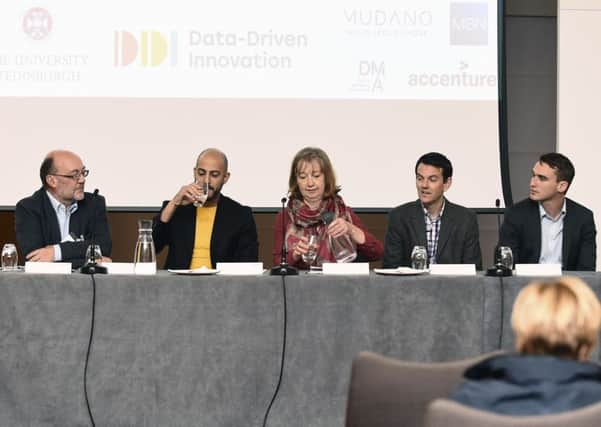Doing Data Right: Through People and Partnerships conference report


That was the view of two speakers at The Scotsman Conferences event Doing Data Right: Through People and Partnerships, who both tackled head-on the fear that technology will leave us “polishing robots”.
Mark Byrne, head of Accenture’s Applied Intelligence practice in Scotland, described AI as “the biggest technology revolution the world has ever seen” but said it was crucial to consider how it could complement existing capabilities.
He asked if all jobs were under threat from AI, quoting a Bank of England report that 15 million UK jobs were at risk from robots, and an Oxford University study suggesting that 47 per cent of jobs were threatened by automation by 2033.
“Are the jobs all going? What will we all be doing, polishing robots?” asked Byrne. “Do we really believe we are done and all problems are solved? If the answer is no, there is plenty more to do. We are in a massive period of change but we have been here before. We need to consider the skills and workforce of the future but I challenge the assertion that AI is here to replace us and will make us obsolete.”
Byrne used the example of Amazon, which increased employee numbers from just over 20,000 in 2008 to almost 650,000 in 2018. The business is highly focused on technology, data and AI and although warehouse jobs were fewer, Amazon was recruiting (proportionally) more skilled people in areas like design, data science and customer experience.
“If we do data right, we have the potential to make society a better place and humans will still have a big role to play,” said Byrne. “Let’s steer that journey.”
Ed Broussard, chief executive and co-founder of Mudano, also described an AI-dominated future: “It looks like some kind of interaction with AI. In 15 years, AI will be so commoditised that we will interact with it all day, every day. Everything about us will be represented in data in 15 years. AI will be much better equipped to make your financial decisions than you will.”
Many problems would be “regged” (regulated) or “scandalled” out, Broussard argued, adding: “Where there is a much more interesting debate is ethical issues, where there is no clear answer. For us to build AI, we have to train it in what success looks like – and ask why we are optimising it. For more money, for consumerism, for happiness? Isn’t making decisions and making mistakes part of being human? Do I want optimal all the time?
“It’s the greatest opportunity for happiness and redistribution of wealth that we have ever had, but also the greatest ever opportunity for the concentration of power and wealth.
“So, in 15 years, we will use AI in every aspect of our life. We will go through a period of rapid change which will magnify everything that is good and bad in society, and society will still have good and bad aspects. We will never agree what is ethical and what is not. It’s about what we build rather than what we decide; never before have humans had so much ability to decide the future.”
The chair of the Data Marketing Association Scotland made a plea for the value of data to be understood and unlocked. Firas Khnaisser, also head of Decisioning at Standard Life, said he preferred to describe data as “the new soil” rather than “the new oil” – with good things capable of growing from data, rather than it being something trapped underground to be suddenly unleashed.
He also said it was wrong that data had no place on the business balance-sheet. “You’ll find it under ‘goodwill’ but that’s not doing data justice – and its value if you are selling a business is different to its value in terms of operational efficiency.”
In terms of data value, Khnaisser argued lines between consumers and producers were being blurred: “We produce content but are we rewarded for it? There is always a silver lining with a scandal like Cambridge Analytica. It was a watershed moment and made people ask what they didn’t understand and what they needed to reconsider. It put value into the foreground.
“How much are you aligned to Facebook to show distant relatives pictures of your children? We might decide it’s fine but we need to be given the opportunity to make the decision, not just share the information without being asked.”
Khnaisser said customers were being empowered to make their own decisions and that the “vanilla” approach of the past could not continue. “Brands need to be brave when it comes to consent,” he said, highlighting the decision by Nike to feature Colin Kaepernick of the San Franciso 49ers American football team in its 30th-anniversary campaign after Kaepernick kneeled during the US national anthem to protest against racial injustice. Many Republicans boycotted Nike and even burned their shoes, but the company’s profits rose.
Khnaisser did express concern that there was “a Black Mirror” angled towards us all, but concluded on a positive note: “Data can be a force for good and we will succeed in the end.” He added that Edinburgh could benefit as it was “a relatively small community working successfully across the private, public and academic sectors.”
Jarmo Eskelinen, head of the Data-Driven Innovation (DDI) programme – part of the Edinburgh and South East Scotland City Region Deal – said the city was very well-placed to capitalise on the opportunity to become the data (and data ethics) capital of Europe.
“Edinburgh is disproportionately packed with talent and is a real hotbed of digital innovation,” he said. “It has the mindset of doing data right and engages in strong international cooperation.”
He likened the DDI initiative, at one year old, to a child of the same age: “They stumble and fall on their nose, but then get up and start again. We are in a similar position.”